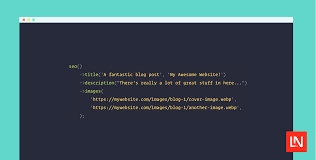Laravel SEO: Optimizing Your Website with Laravel Framework
Search Engine Optimization (SEO) plays a crucial role in driving organic traffic to your website. When it comes to building a website that is not only functional but also search engine-friendly, Laravel, a popular PHP framework, offers a range of features and tools to help you optimize your site for better visibility.
Why Choose Laravel for SEO?
Laravel provides developers with a clean and elegant syntax that makes it easy to implement SEO best practices. The framework’s built-in features, such as routing, caching, and database migrations, help improve website performance and user experience – both of which are essential for SEO.
Key Features for SEO in Laravel:
- Routing: Laravel’s flexible routing system allows you to create SEO-friendly URLs that are easy for search engines to crawl and index.
- Caching: By implementing caching mechanisms in Laravel, you can improve page load times, which is a crucial factor for SEO ranking.
- Migrations: Laravel’s migration system enables you to manage database changes efficiently, ensuring that your site’s content is always up-to-date and relevant for search engines.
- Blade Templating: With Blade templating engine in Laravel, you can create structured HTML templates that are optimized for search engines.
- Eloquent ORM: Laravel’s Eloquent ORM simplifies database interactions, making it easier to organize and retrieve data – a key aspect of effective SEO strategy.
Best Practices for Implementing SEO in Laravel:
- Title Tags & Meta Descriptions: Ensure each page has unique and descriptive title tags and meta descriptions that accurately reflect the content.
- Clean URL Structure: Use meaningful URLs with relevant keywords to improve search engine visibility.
- Sitemap & Robots.txt: Create XML sitemaps and robots.txt files to guide search engine crawlers through your site effectively.
- Optimized Images & Media: Compress images, use descriptive alt tags, and optimize media files for faster loading times.
- Mobile Responsiveness: Ensure your website is mobile-friendly as mobile-friendliness is a significant ranking factor in search engines like Google.
In conclusion, leveraging the power of Laravel framework can significantly enhance your website’s SEO performance. By following best practices and utilizing Laravel’s features effectively, you can create a well-optimized website that ranks higher in search engine results pages (SERPs) and attracts more organic traffic.
Top 5 Essential SEO Tips for Enhancing Your Laravel Website’s Visibility
- Optimize meta titles and descriptions for each page using relevant keywords.
- Create SEO-friendly URLs by including keywords and keeping them concise.
- Generate a sitemap to help search engines index your site more effectively.
- Utilize Laravel’s routing system to create clean and structured URLs for better SEO performance.
- Implement schema markup to provide search engines with additional context about your content.
Optimize meta titles and descriptions for each page using relevant keywords.
To enhance your website’s SEO performance with Laravel, it is essential to optimise meta titles and descriptions for each page by incorporating relevant keywords. By crafting compelling and keyword-rich meta titles and descriptions, you can improve the visibility of your pages in search engine results. This practice not only helps search engines understand the content of your pages better but also entices users to click through to your website. With Laravel’s flexibility and ease of implementation, customising meta tags with targeted keywords can significantly boost your site’s organic traffic and overall search engine rankings.
Create SEO-friendly URLs by including keywords and keeping them concise.
Creating SEO-friendly URLs is a crucial aspect of optimising your website for search engines, especially when working with Laravel. By incorporating relevant keywords into your URLs and ensuring they are concise and descriptive, you can improve the visibility of your web pages in search results. This practice not only helps search engines understand the content of your pages better but also enhances user experience by providing clear and informative links. With Laravel’s flexible routing system, crafting SEO-friendly URLs becomes a straightforward task that can have a significant impact on your site’s overall SEO performance.
Generate a sitemap to help search engines index your site more effectively.
Generating a sitemap is a crucial tip for improving SEO in Laravel. By creating a sitemap, you provide search engines with a structured map of your website’s content, making it easier for them to crawl and index your site effectively. This helps search engines discover all the pages on your site and understand their relevance, ultimately boosting your site’s visibility in search engine results. Implementing this simple yet powerful strategy can significantly enhance your website’s SEO performance and increase its chances of ranking higher in search engine results pages.
Utilize Laravel’s routing system to create clean and structured URLs for better SEO performance.
By utilising Laravel’s routing system, website developers can craft clean and structured URLs that not only enhance user experience but also improve SEO performance. Creating SEO-friendly URLs is essential for search engines to easily crawl and index website content, ultimately boosting visibility and ranking. Laravel’s flexible routing capabilities empower developers to design URLs that are descriptive, relevant, and optimised with keywords, contributing to a more streamlined and effective SEO strategy.
Implement schema markup to provide search engines with additional context about your content.
Implementing schema markup in your Laravel website is a valuable tip for enhancing your SEO efforts. By incorporating structured data using schema markup, you provide search engines with additional context about your content, making it easier for them to understand and index your pages accurately. This not only improves the visibility of your website in search results but also enhances the overall user experience by displaying rich snippets that can attract more clicks. Schema markup is a powerful tool that can give your site a competitive edge in search engine rankings and drive more organic traffic to your web pages.

